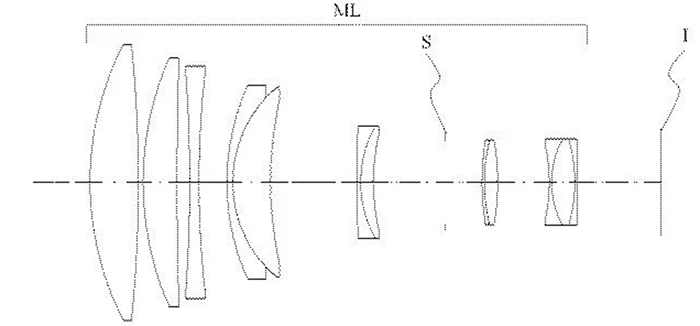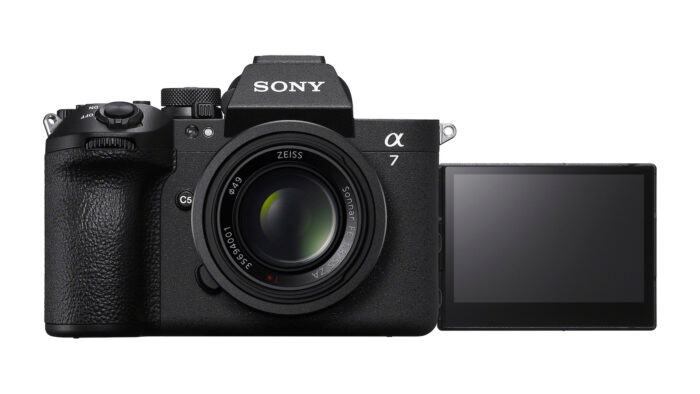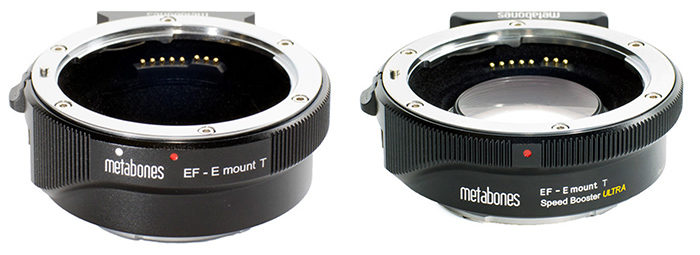Cool: Metabones adds “Native” AF and Smooth Iris to EF Mount Speed Boosters and Smart Adapters by Firmware
Metabones just released a new firmware update for Canon EF to E-mount Smart adapters and Speed Boosters: “EF-Mount lenses are now capable of focusing quickly across the widest variety of mirrorless cameras with trusted Metabones precision and reliability. The smooth iris feature slows down the movement of the electromagnetic aperture diaphragm so that video footage transitions smoothly when the aperture changes, with reduced tick noise from the lens. The latest Canon and Tamron SP lenses have special support for this feature and Metabones® makes use of it if the lens supports it.”
Downloads links:
Firmware update for EF-E Smart Adapter MARK IV and EF-E Speed Booster ULTRA (Windows)
Firmware update for EF-E Smart Adapter MARK IV and EF-E Speed Booster ULTRA (Mac)
Firmware update for EF-M43 (Windows)
Firmware update for EF-M43 (Mac)
Here is the full press text:
Vancouver, Canada, June 23, 2016: Metabones® releases Metabones App 2.3, a major firmware update with the following additional features.
Eye-AF (A6300/A7 series).
Fast contrast detect AF for all E-Mount cameras.
DMF (direct manual focus) for E-Mount cameras, where the camera switches to MF as soon as AF completes. This is useful for checking AF accuracy when used with focus peaking.
Smooth iris for Sony E-Mount and FZ-Mount cameras and Blackmagic, JVC and Panasonic Micro Four Thirds Mount cameras.
Metabones® has already added fast EF lens autofocus to its Micro Four Thirds Mount Speed Boosters® and Smart Adapters™ last year. With this speedy advantage now extended to E-Mount, EF-Mount lenses are now capable of focusing quickly across the widest variety of mirrorless cameras with trusted Metabones precision and reliability.
The smooth iris feature slows down the movement of the electromagnetic aperture diaphragm so that video footage transitions smoothly when the aperture changes, with reduced tick noise from the lens. The latest Canon and Tamron SP lenses have special support for this feature and Metabones® makes use of it if the lens supports it.
Limitations:
E-Mount “native” autofocus features may not work with all lenses.
“Native” autofocus may be lesser in performance and/or accuracy compared to the original “Green” mode phase-detect autofocus for A6300, A7 Mark II and A7R Mark II.
AF-C and video autofocus may have unsatisfactory AF performance and/or accuracy. This is a limitation inherent in DSLR lenses, which lack the low latency required for making many fine movements in rapid succession during AF-C and video focusing.
Excessive hunting may occur if a small aperture is used with AF-C, video or “Liveview Display Setting Effect” turned on.
The first few autofocus attempts may result in false positives where the camera gives focus confirmation but the subject is not in focus. This issue goes away on its own after a few trials with most lenses.
No support for in-camera correction such as peripheral shading, CA and distortion.
Power consumption may increase compared to the original “Green” mode autofocus. We recommend turning off the “Pre-AF” option to conserve battery power. On A7 series cameras and A6300 the option is on page 3 under the “gear” tab.
Actuations of the electromagnetic aperture diaphragm and/or the focus motor of the lens result in noises which may be picked up by the camera’s internal microphone during video recording. Use of an appropriately placed external microphone is required for video work.
The aperture moves in 1/3 stop steps with most Panasonic cameras and 1/8 stop steps with other cameras, which may be noticeable in video recordings. Programmed exposure mode and shutter priority exposure mode should not be used for video. Lenses supporting “smooth iris” smooth out the transition but do not increase iris resolution.
The following lenses have been tested for “native” AF. Refer to Metabones’ web site for the most up-to-date list. Lenses equipped with smooth iris support are marked with asterisks. APS-C lenses are not compatible with Speed Booster®.
Canon EF 8-15mm f/4L USM Fisheye*
Canon EF-S 17-55mm f/2.8 IS USM
Canon EF-S 18-55mm f/3.5-5.6 IS II*
Canon EF 24-105mm f/4L IS USM
Canon EF 28-80mm f/3.5-5.6 II
Canon EF 40mm f/2.8 STM*
Canon EF 50mm f/1.2L USM
Canon EF 50mm f/1.4 USM
Canon EF 70-200mm f/2.8L IS II USM*
Canon EF 70-200mm f/4L USM (non-IS)
Canon EF 70-300mm f/4-5.6L IS USM*
Canon EF 85mm f/1.2L II USM
Canon EF 100mm f/2.8L IS USM Macro*
Canon EF 100-400mm f/4.5-5.6L IS USM (I)
Canon EF 100-400mm f/4.5-5.6L IS II USM*
Canon EF 200mm f/2.8L II USM
Canon EF 300mm f/4L IS USM
Sigma 18-35mm f/1.8 DC HSM Art 013
Sigma 24-105mm f/4 DG OS HSM Art 013
Sigma 50mm f/1.4 EX DG HSM
Tamron SP 24-70mm f/2.8 Di VC USD A007
Tamron SP 45mm f/1.8 Di VC USD F013*
Tamron SP 70-200mm f/2.8 Di VC USD A009*
Incompatible lenses: (“Green” mode PDAF is still supported on A6300, A7 Mark II and A7R Mark II.)
Canon EF 50mm f/1.8 II
Canon EF 100mm f/2.8 USM Macro
Canon EF 135mm f/2L USM
Contax N lenses modified to EF mount by Conurus Canada
Sigma 18-125mm DC OS HSM
Tamron SP 17-50mm f/2.8 Di II VC B005
Tamron 28-300mm f/3.5-6.3 (IF) Macro A20
OSX and Windows versions of the firmware updater are available for download from Metabones’ web site. The same download updates Speed Booster® ULTRA, Smart Adapter™ Mark IV, EF to FZ Mount Smart Adapter and all EF Mount to Micro Four Third mount products. Updates to earlier Smart Adapters™ (I, II and III) and the original Speed Booster® are by factory only and are free of charge except for shipping.




